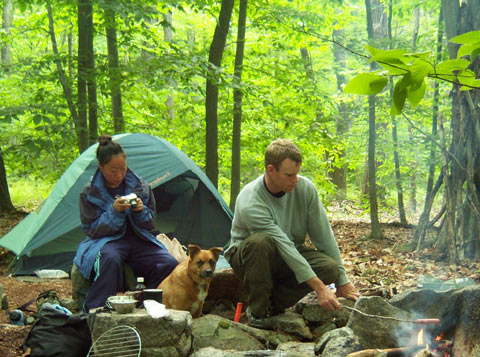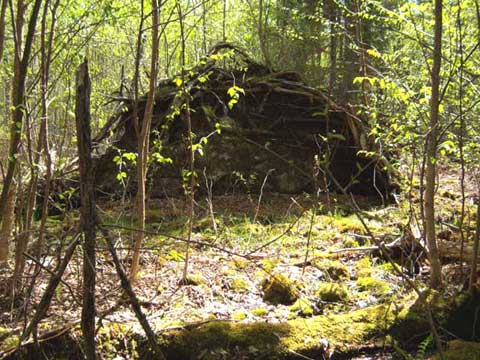 How to
Practice Wilderness Survival
How to
Practice Wilderness Survival How to
Practice Wilderness Survival
How to
Practice Wilderness SurvivalFOREWORD
How do you practice survival? I get this question a lot in emails, and rather than continue sending individual responses, I figured a page should be devoted to answering the question in depth..
A lot of those emails go something like this:
READER'S EMAIL: "Gee, M40. Me an some frends are gonna take some nives and stuff an go out in the woods for a couple weeks to practis survivin. Any advice?"
M40'S RESPONSE: "Hmmm... yes... my advice is please don't reproduce."
How to Practice Wilderness Survival
The fact of the matter is that actual wilderness survival
with nothing but a few odds and ends from an emergency kit is an utterly miserable experience. I DON'T
recommend running out into the woods with your knife or kit and trying to survive. You
gain nothing from that misery, and you may as well practice bleeding for all the
good it will do you.
I also don't recommend just reading about it. Mark Twain once said, "Knowledge
without experience is just information". He was quite right. We all knew those
kids who were "smart in school, but dumb on the bus". With all of their
book-smarts, they couldn't figure out how to stop the daily beatings. In this
analogy, wilderness survival knowledge is schoolwork, but mother nature is the
bully on the bus. So how do we gain hands-on experience without the misery? The
answer is simple... GO CAMPING.

Camping is extremely valuable practice, and even more so
if you go with friends who are also interested in learning outdoor skills. It will
quickly let you know which items you've packed that cover actual needs, and
which items are simply adding to your comfort level. The first thing you'll
notice over multiple camping trips is that your pack will become gradually
lighter. You'll learn what items you need and why, and over time, you won't
bring nearly as much. Instead, you'll learn to make due with bare essentials,
and you'll start to improvise the rest. Having a few like-minded friends with
you will allow you to put your heads together and compare notes. You'll find
there's a lot of different ways to do things and a lot of improvisation will
take place.
While you're out there... PRACTICE YOUR SKILLS! You should always have a lighter
in your pocket, but pull out that magnesium fire starter instead and light your
campfire with it. Why wait to use it until you have a real emergency? If you've
built a bunch of fires with it, then it will be much quicker and easier if you
ever really need to use it. Try some different types of fire pits. My favorite
is the lazy-man fire.

A "Lazy Man" fire with a nice 3-sided stone fire pit, and a high back to reflect light and heat back into camp.
Once you're settled in, hike around your surrounding area, and make note of things that would be valuable if your gear were suddenly gone. This might include a rock ledge or a pile of brush that would make building a shelter much faster. Look for thick evergreens to make a bed, and for dry grasses and moss for tinder. Keep your eyes open for potential water sources, food sources and game trails. You can try some compass navigation as well as natural navigation by sun and stars.

This upturned tree's roots have formed a partial canopy. It's
almost a ready-made shelter.
Each time you go out, try different skills, and be as "hands-on" as you can. This will expand your skill set, but more importantly, it will increase your comfort level and familiarity in using those skills. Eventually, you may find yourself attempting to build a shelter instead of using a tent. DON'T leave your tent home! If rough weather blows in and your shelter isn't up to par you'll be absolutely miserable. Again... there's nothing gained in that misery, and you're back to practicing bleeding. If you're beginning to see a trend here, it's to use your head. Don't put yourself in dangerous situations for the sake of the danger. Adrenaline junkies are just as stupid as any other junkies, and they all end up just as dead.

A thick evergreen can provide a good basis for shelter in the wintertime!

This moss covered rock ledge is a shelter just waiting to happen. Just look at all your roof timbers and leaf cover just lying there!
Over time, you'll find that your confidence in your abilities will grow exponentially. Your awareness of your surroundings will change as well. Without thinking about it, a house painter probably notes every house that has peeling paint as he drives by. While driving down the street, I find that my eyes and mind will be scanning the woods along the roadside, seeing potential shelter locations and making note of streams and wildlife. It's not intentional, and almost not a conscious thought.
Copyright M40 - Jan 24th, 2008